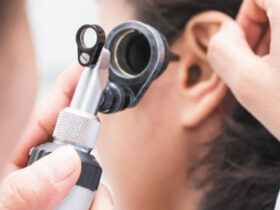Dr. Katia Taba, Board-Certified Ophthalmologist and Retinal Specialist
 In adults over the age of 50, age-related macular degeneration (AMD) is the leading cause of blindness. It is estimated that more than 10 million Americans have some degree of AMD, and unfortunately, there is still no cure for the disease, But there is a great treatment for some forms of the disease.
In adults over the age of 50, age-related macular degeneration (AMD) is the leading cause of blindness. It is estimated that more than 10 million Americans have some degree of AMD, and unfortunately, there is still no cure for the disease, But there is a great treatment for some forms of the disease.
In AMD the portion of the retina responsible for our central vision, the macula, becomes damaged leading to a loss of vision, distortion or blind spots in central vision. Although it is a very complex disease and still not completely understood, it can be brought on by both hereditary and environmental factors.
There are two main types of AMD, wet and dry. Dry macular degeneration is the most common form of the disorder. Whitish deposits (drusen) adhere to the retina, just under the macula and eventually, the drusen weaken and deteriorate the macula, that can lead to severe central vision loss and blindness. Typically, AMD starts as the dry type and may progress into the wet form of the disease in 10-15% of high-risk dry macular degeneration.
Macular degeneration has several therapies that prevent the disease from progressing. One of the main treatments is the anti-VEGF injection.
Dr. Taba, Ophthalmologist and Retina Specialist explains, “In a National Eye Institute (NEI) study, researchers concluded that before the anti-VEGF
(anti-vascular endothelial growth factor) injections, 2/3 of wet macular degeneration patients went legally blind within two years of diagnosis. Now, we are able to keep vision 20/40 or better in more than half of our patients. Early detection is essential for prevention of visual loss from AMD. The earlier we can treat a newly diagnosed wet AMD lesion, the higher chance the patient has of preserving central vision.
The Following information was published by the American Academy of Ophthalmology.
The Impact of Diet
While clinicians wait for dry AMD treatments, what concrete steps can be recommended to patients today?
“Diet plays a major role in macular degeneration, and it seems to be important in all stages” of the disease, said Emily Chew, MD, Deputy Director of Division of Epidemiology and Clinical Research at NIH. Her review of data from the Age-Related Eye Disease Study 1 (AREDS1) and AREDS2 took advantage of the largest data pool available on macular degeneration with the longest follow-up ever conducted.1 “We had 13,204 eligible eyes in 7,756 participants with a 10-year follow-up, looking at diet and progression to late AMD, GA, and neovascular AMD,” Dr. Chew said.
The key takeaway? “Greater adherence to the Mediterranean diet—particularly fish intake—is associated with a lower risk of progression in eyes with different severity of AMD,” she said. “We found that if you have very early AMD, progression from the early to intermediate stage could be reduced by about 25% by eating a Mediterranean diet.” She added, “When we looked at patients in the intermediate group, a very high adherence to the Mediterranean diet had almost a 30% reduction in progression to late macular degeneration. It’s a dose/response effect: The more you follow this diet, the greater the benefit,” particularly with regard to geographic atrophy, the advanced form of dry AMD.
Impact of Genetics
Complement factor H may also play a synergistic role.2 “If you have complement factor H genetic changes and eat the Mediterranean diet, you get even more of a beneficial treatment effect,” Dr. Chew said.
If you make just one change. What one dietary change should ophthalmologists encourage their patients to adopt? “What really drove the results of the Mediterranean diet was eating fish,” she said. “Patients should consider eating fish twice a week.”
If you go full Mediterranean. The nine “eating points” from the Mediterranean diet are as follows: Decrease your intake of 1) red meat and 2) alcohol even as you increase your intake of 3) fish, 4) vegetables, 5) whole fruit, 6) whole grains, 7) nuts, 8) legumes, and 9) “good” fats. The latter, notably olive, walnut, and safflower oils, have a beneficial ratio of MUFA:SFA (monounsaturated fatty acid to saturated fatty acid).
And remember AREDS2 supplements. Dr. Chew’s work has also confirmed the benefits of the AREDS2 supplements.2 “They reduce the risk of developing vision-threatening late disease by about 25%,” Dr. Chew said. “We hope ophthalmologists are recommending this to their patients with intermediate AMD.”
Other Beneficial Ways to Prevent and Protect Vision
• Stop smoking
• Wear protective eyewear
• Wear sunglasses
• Control blood pressure
• Control blood sugar
• Exercise
• Reduce sugar and salt intake
• Eat a healthy diet that consists of omega-3 fatty
acids, flaxseeds, lean protein (avoid red meat) and
plenty of fruits and vegetables.
If you are experiencing any changes in your eye health, whether it is blurry vision, pain, impaired vision, or any other visual irregularities, you should see an ophthalmologist right away. The earlier a disease is detected, the better the outcome and treatment options are for you. You will find a friendly and warm environment at Personalized Retina Care of Naples. Please call (239) 325-3970 today to schedule your eye exam. When necessary same day appointments can often be accommodated.
Personalized Retina Care of Naples provides comprehensive diagnosis and treatment for retinal disorders. Dr. Taba also gives second opinions on retinal and general eye conditions. Dr. Taba is a Board-Certified Ophthalmologist and is Fellowship trained in surgical and medical retinal diseases.
There are ways to regain your independence and correct low vision. To find out more, or to schedule your appointment, please call Personalized Retina Care of Naples at (239) 325-3970 today.
Personalized Retina Care
www.retinanaples.com | 239-325-3970
3467 Pine Ridge Rd., Suite 103, Naples 34109
Reference:
1 Keenan TD et al., for the AREDS1 and 2 Research Groups.
Ophthalmology. 2020;127(11);1515-1520.
2 Chew EY. Am J Ophthalmol. 2020;217:335-347.










